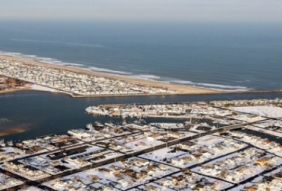
Posted on May 3, 2016
By MaryAnn Spoto, NJ Advance Media for NJ.com
A Superior Court judge on Friday refused to delay condemnation proceedings against a group of oceanfront homeowners fighting beach replenishment but allowed a group of Bay Head residents to join in the push to convince the court that the project is moot in their town.
The decision by Superior Court Assignment Judge Marlene Lynch Ford allows the state to move forward with condemnation actions in northern and southern Ocean County to obtain the rights to build large dunes and wider beaches.
However, her decision also gives a group of Bay Head residents – including a former ally of Gov. Chris Christie – the chance to upend what the Republican governor had envisioned as a uniform coastal protection plan for New Jersey.
Still, the ruling in what has evolved into nearly weekly court appearances for attorneys on both sides drew praise from state officials who have been battling for more than two years to start beach replenishment work in key areas of Ocean County and other sections of the state.
The Bay Head homeowners contend a rock wall built in 1962 and extended after Hurricane Sandy is a more effective way of protecting the town and the homes behind it from massive ocean surges during storms
“We are clearly happy with the courts’ continued recognition of the state’s authority to use eminent domain laws for the purposes of shore protection,” state Environmental Protection Commissioner Bob Martin said in a statement issued after the three-hour proceeding in Toms River. “We will continue to move forward with the U.S. Army Corps of Engineers for the current beach and dune construction project on Long Beach Island and our forthcoming project in northern Ocean County for the protection of homes and businesses along the coast.”
Ford ruled last month that the state has the authority to condemn private oceanfront property to create public beaches through beach replenishment.
But a group of oceanfront residents went back to court on Friday asking her to order the state to hold off on completing those condemnation procedures while they appeal her March 28 decision.
“Condemnation cases are special cases,” argued Scott Heiart, an attorney for some of the property owners. “Once this project goes through, there’s no undoing (it).”
But Dale Lessne, an attorney representing the state, contended that there would be no irreparable harm if the state continued condemnation proceedings while the issue goes to the Appellate Division. She said eminent domain laws don’t automatically require the condemning agencies to hold off until the appeals process finishes, as Heiart had argued.
“No public project would ever be able to proceed until all appeals are exhausted,” Lessne argued. “There would never be any schools built, there would never be any highways built…until all appeals are exhausted.”
Ford agreed that there could be changes to the homeowners’ properties by the time their appeals are resolved, but said those wouldn’t be irreparable.
“If public access… is reversed, it becomes reversed back to what they had before – a private beach,” Ford said. “Even if there are enhancements in terms of sand on a beach, we know that, frankly, sand comes and goes…The mere fact that sand is pumped on the beach, I don’t think constitutes an irreparable harm nor an immutable change to the property.”
The DEP won that round, but Ford later ruled against the state agency’s attempt to block more than 40 Bay Head and Point Pleasant Beach residents from joining in a hearing to determine whether a rock wall in those two towns and neighboring Mantoloking is sufficient storm protection to warrant stopping beach replenishment in those communities.
In her March 28 decision, Ford gave two Mantoloking oceanfront property owners the chance to have a hearing on that issue. And since that ruling, other residents protected by that nearly 2-mile stretch of wall sought to join in the argument.
One of those Bay Head residents joining in the fight is Lawrence Bathgate, a prominent Republican fundraiser who has publicly criticized Christie’s push to require beach replenishment for all of New Jersey’s beaches along the Atlantic Ocean.
In trying to prevent the property owners from joining in the fight, attorneys for the state argued the cases are too dissimilar to warrant intervention and their involvement would only slow down the original case.
Collectively, the property owners allowed in the case own nearly two-thirds of Bay Head’s nearly 80 oceanfront parcels.
“Their cases may be similar, but they will be dealt with differently,” said attorney John Curley.
But Anthony DellaPelle, an attorney representing 23 property owners, and Peter Wegener, an attorney representing 21 property owners, argued the cases are very similar and would be more efficiently handled by consolidating them because many of the witnesses – such as the engineering experts – would be the same in each.
That hearing is scheduled for several days in October and November.
Ford said that while some details of the cases would be different, she would wind up repeatedly listening to the same testimony if she had to hold separate hearings.
http://www.nj.com/ocean/index.ssf/2016/04/judge_wont_delay_oceanfront_condemnations_allows_m.html





